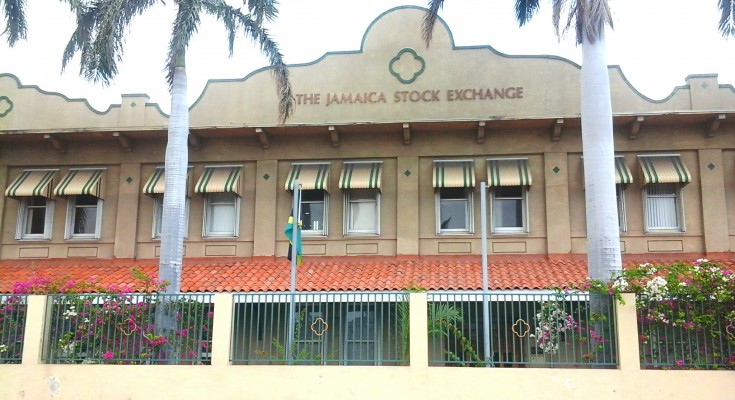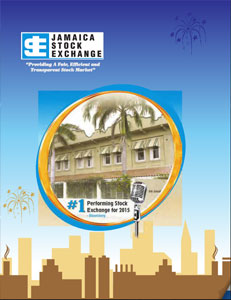Jamaica Stock Exchange Limited
#1 performing stock exchange in the world
Business View Caribbean profiles Jamaica Stock Exchange Limited, the principal stock exchange of Jamaica. Located in Kingston, Jamaica.
Marlene Street-Forrest is the General Manager of the Jamaica Stock Exchange. Recently, Business View Magazine talked with her about the role the Exchange plays in the economic life of the island nation, and how its various financial services operate. The following is an edited version of that conversation.
Can you tell us how the Jamaica Stock Exchange began?
“The Stock Exchange was started in 1968; we began trading in 1969. It was born out of our Central Bank. And the objective, both then and now, is to ensure that we have an orderly market for raising capital for the development of businesses and the country, and also to ensure that we have an efficient and orderly secondary market for the transfer of these securities. The idea was that we were of age – we got our independence in 1962 – to have an orderly stock exchange.”
How is the Exchange structured?
“The Jamaica Stock Exchange, the only exchange in the country, so far, is a public, Limited Liability Company (LLC), owned by its shareholders; it is a demutualized exchange – the first to be demutualized in the English-speaking Caribbean.” (Demutualization is the process by which a customer-owned mutual organization or cooperative changes its legal structure to form a joint stock company. Historically, stock exchanges started as mutually governed, self-regulated structures where profit was not a very strong motive.)
“What we did, in 2008, is to separate the ownership of the exchange from the regulation of the exchange to ensure greater corporate governance, [and to address] any concern persons may have that there could be improprieties in respect to a decision taken by a broker/member who is also member of the Board of the Exchange. So, we have regulatory functions separate from the Board of Directors. This is common in the more global exchanges; for example, the New York Stock Exchange is a demutualized exchange.”
What are the requirements for a company to be listed on the Jamaica Stock Exchange?
“We have different markets – we have the main market, and the junior market. The requirements for a company to be listed on the main market are different, somewhat, from listing on the junior market. However, in general, the listing on a market would require that that company is a public company from the CARICOM region, except where, if the company wants to list on our exchange and is domiciled otherwise, the company would have had to be listed on a major exchange in its own jurisdiction.
“In terms of capital, the company must bring to the market 20 percent of the ownership of that company; for the main market it must be in the hands of 100 shareholders, and for the junior market, 20 percent of the ownership of the company must be in the hands of, at least, 25 shareholders. And the reason for this is so that there can be ‘float’ in the market – the Articles of Incorporation must state that the shares are freely transferable. The company must also be bound by the listing agreement of the Jamaica Stock Exchange in terms of pre-listing and post-listing requirements. The company must produce its quarterly financial statement, its annual financial statement, audited financials, and its annual report on a timely basis. Other than that, it follows normal rules of the Exchange or the company can be suspended or de-listed.
‘The company, when it comes to market to be listed, must get the approval of a Committee of the Board, called the Listing Committee. Again, the company must have a Board of Directors, an audit committee, and all the various requirements of a global, recognized stock exchange, as embedded in our rules.”
How many companies are currently listed on both exchanges?
We have approximately 62 companies listed on the main exchange and the junior market; 25 companies on the junior market and the difference on the main market.
How many brokers work the Exchange?
There are 12 brokers that have been approved as member/dealers of the Jamaica Stock Exchange and these brokers also have to be approved by the Financial Services Commission, which is comparable to the U.S. Securities Exchange Commission (SEC). Also, the Jamaica Stock Exchange is licensed by the Financial Services Commission and regulated by it, as well.
Is there a typical type or size of company that gets listed? In the states, there are different exchanges – one just for technological companies, for example. I imagine, since the Jamaica Exchange is much smaller by comparison, that any company that meets your criteria can join.
Correct. So, for example, where you have the NASDAQ that is heavily technological, ours is not. So, we have banking, we have insurance, we have manufacturing – any company, so long as it meets our requirements can be listed on the Exchange.
Are most of the 60 plus companies that you mentioned, Jamaican?
Yes. And you find that more and more that they are predominantly Jamaican. We also have, for example, the Trinidad Cement Company, which by virtue of its name, you realize is from Trinidad and Tobago. It is cross-listed on our Exchange. By cross-listing, I mean that it is listed on the Trinidad and Tobago Stock Exchange and it’s also listed on ours.
If a company wanted to trade its stock, are there any alternatives available?
We are the only exchange that trades publicly-listed companies. A company that is listed on our Exchange trades on our Exchange, so we are the only game in town.
You said that you became a demutualized exchange in 2008. Has anything else occurred recently, or planned for the near-term future, that will further impact the way you operate – expansions, upgrades, new initiatives?
When we talk about the Exchange, we’re talking about the Exchange Group, because we have subsidiaries. The Jamaica Stock Exchange has a subsidiary called the Jamaica Central Securities Depository (JCSD) and it has a subsidiary called the Trustee Services Limited. I say that in order to answer that question. The Stock Exchange, in and of itself, supports the market in terms of the listing of companies, of bonds, and different markets. We, in turn, are supported by the JCSD, which is the settlement arm of the company. We see ourselves as providing full service, so, in terms of building out our resources, we added the Trustee Services and other services, like registrar services. And that is how we are developing the Exchange, or the Exchange Group, in order to provide full services in respect to anything related to securities. These are ongoing improvements and expansions to ensure the viability and sustainability of the Exchange. So, we don’t only depend on revenue in relation to trading on the market, but on other things, as well.
Anything else new or planned for the near-term?
You have to be relevant. So, we just launched our online trading platform and that is just to keep up with technology and to offer to our investors another way in which they can connect and trade through the Stock Exchange. That is a strategic direction so that persons in the Diaspora, and persons all over the world, can purchase or transact easily and more conveniently.
The traditional picture of a stock exchange floor is a noisy, raucous place where people are shouting orders and screaming over one another. But these days, as you suggest, a lot of trading is being done online. Do you have that traditional trading floor anymore?
As far back as 1998, we have had an electronic trading platform. So, the days of the ‘open outcry’ are gone for us. So, you have an electronic trading platform, which is separate and apart from allowing persons to trade online.
Because when you trade online, you’re going through an established broker, right?
Yes, you still are going through an established broker. And I’m happy that you know that, because so many times, people believe that online trading means that an investor connects directly to an exchange – which they don’t.
Without the ‘open outcry,’ I imagine that the Exchange is kind of a quiet place to work.
It looks quiet, but because we are doing so many things – building on our current platform – the Stock Exchange is not very ‘quiet.’ We are building out our trustee, our registration, our repo business where we are acting as the trustee for the government’s Repurchase Agreement. We are also developing a market for Jamaica Depository receipts, so by the end of the first half of 2016, we will be launching that market. And so, we continue to look at opportunities and to look at what may interest our investors or member/dealers. Anything that is compatible, or could be of interest to our investors, we look at and see whether it is something that we will pursue.
How many employees are doing all of this work?
In the Exchange Group, we have somewhere in the region of 80 employees.
What are some of the Exchange’s long-term plans? What significant objectives would you like to see achieved over the next, say, five years?
Looking down the road, you would see us being the platform for the trading of government securities, because we don’t currently trade government bonds; you would see us being the one-stop-shop for all things securities, so you would be seeing options – right now we’re not trading options, so you would see an options market; you would also see us trying to facilitate the government in the area of foreign exchange trading. What we see ourselves as is a company that will provide financial services, not only for Jamaica, but for the wider region, so we’re looking internationally for persons to see opportunities and come to our market for its benefits.
In the United States, a criticism of the SEC, the markets’ regulatory agency, is that it is sometimes seen as being prone to political pressures – that it succumbs to the ideology of the whatever administration is in power and, thus, is not an ‘honest broker.’ If the government in Jamaica changes does that affect the regulatory landscape, there?
No, we don’t have that here. We have continuity. There might be a change in emphasis, but definitely not one of quality. We are governed by the Securities Act, and even though we have had a change in government, we are not expecting any change that would be inconsistent with our financial services laws and regulations. I have been at the Stock Exchange for 16 years, so I’ve seen a few changes in government and our Securities Act has withstood all of that.
Now that our time is almost up, what are some of the most important points that you would like our readers to take away from this conversation?
Our fine regulatory system. Corporate governance is very important to us and, as such, we properly regulate our listed companies and our member/dealers. And we, ourselves, are regulated. And we were cited by Bloomberg as being the Best-Performing Stock Exchange in the world for 2015. And if we were not considered – from a global standard – as a stock exchange with credibility, we would not have been cited by Bloomberg. Credibility – we thrive on that. Also, in term of our outward look, we are a small but progressive stock exchange that easily facilitates capital expansion.
Check out this handpicked featured on The Barbados Stock Exchange.
AT A GLANCE
WHO: Jamaica Stock Exchange Limited
WHAT: The principal stock exchange of Jamaica
WHERE: Kingston, Jamaica
WEBSITE: www.jamstockex.com
PREFERRED VENDORS

Software Architects Ltd. – Established in 2007, Software Architects Ltd. (SA) prides itself on being a client- centric, IT Consultation Company. SA understands that clients need more than software development; they need IT partners that can remove the mystery and complexity surrounding the technologic space. With this in mind, SA endeavors to allow its clients to focus on their core business while it investigates, guides, and implements solutions that validate its slogan: “Tomorrow’s Technology…Today.” www.softwarearchitectsjm.com

Livingston, Alexander & Levy – Livingston, Alexander & Levy (LIVAL) is a full service law firm. Its team of 22 Attorneys-at-Law is committed to helping its clients achieve pragmatic solutions with in-depth legal analysis in a timely manner. LIVAL is highly regarded in the areas of Corporate/Commercial, Tax, Pensions, Industrial Relations, Conveyancing, Estates, and Litigation. www.lival.co





